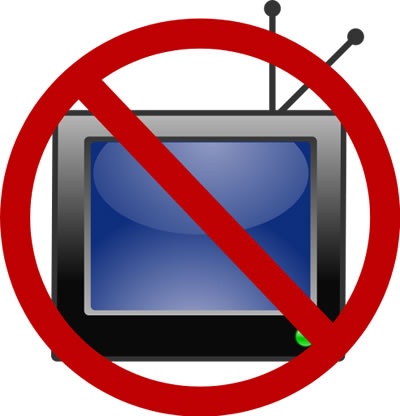
The Great New Zealand Television Turn-Off
In 1992 the New Zealand Library Association organised a campaign in association with the Friends of National Radio (Inc) called the ‘Great New Zealand Television Turn-Off’. This encouraged New Zealanders to turn off their televisions during Library Week (June 21-27) and instead read and take part in other activities. Television turn-offs had been run in the past, but this was the first national turn-off. The concept was endorsed by a number of well-known New Zealanders, including politicians and authors, but also had its share of critics.
Children, parents and teachers were the primary audience for the ‘Great New Zealand Television Turn-Off'. A $10,000 grant from the Lottery Grants Board enabled the organisers to contact 3000 schools and childcare centres about it. They produced a 35-page guidebook which included tips on how parents and teachers could encourage children to take part - and how children could persuade their parents. It also suggested projects that homes, schools, libraries and marae could try out during the week.
The campaign was publicly endorsed by a number of well-known New Zealanders. Among them were politicians, including Prime Minister Jim Bolger, the leader of the Opposition, Mike Moore, and the leader of NewLabour, Jim Anderton. Authors Keri Hulme and Margaret Mahy also lent their support. Mahy wrote the introduction to the guidebook, in which she remarked:
Television has nothing to fear from seven days with a reduced audience. It is too well established to be really vulnerable. But we, the television watchers, do have something to gain - we can become reacquainted with alternatives, and from this anchoring position, may become reacquainted with our ability to choose.
Television broadcasters certainly had no fear of the campaign. TV3 saw it as ‘silly’, while Television New Zealand described it as ‘bizarre’ and argued that ‘whenever a book is televised, it is very much in demand at libraries’. Others critical of the campaign included broadcaster Paul Holmes, who described it an ‘insult’ to hardworking broadcasters.
Both sides could eventually claim victory. During the turn-off campaign the average 24 hour viewing audience fell from 12% to 11% among those surveyed. AGB-McNair, the television research company which collected the data, did not regard this change as significant, and both broadcasters declared that they had not noticed any reduction in viewers. But Denis Dutton, one of the campaign's organisers, noted that this was a decline of almost 10%.
Whatever its success, it has been described as ‘the most noticed - or notorious - Library Week ever’. Library Week was held for more than 35 years, run by New Zealand's library association which became Library and Information Association New Zealand Aotearoa (LIANZA). In 2009 the Library Week theme was Escape, Explore, Discover: Ki te whai ao, ki te ao mārama. Its events included ‘NZ's biggest storytime’ on 12 August and ‘Love your library day’ on 14 August.
Update: the celebration of Library Week was last held nationally in 2010. Read a blog post by Alison Wallbutton relating to its demise.
Further information
- LIANZA (lianza.org.nz)
- Sarah Clarkson, The great New Zealand television turn-off: handbook for parents, teachers, librarians, New Zealand Library Association, Wellington, 1992.

Community contributions